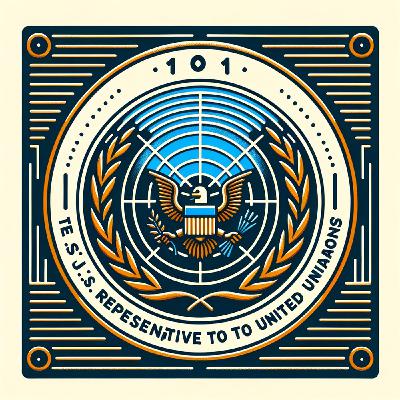Elise Stefanik's UN Nomination Withdrawal: Implications for U.S. Foreign Policy
Update: 2025-09-30
Description
Elise Stefanik was announced last month as President Donald Trump's pick for U.S. Ambassador to the United Nations, but recent developments have shifted attention to the circumstances around her nomination. According to KUOW News, Stefanik, a critical ally of Trump and House Republican Conference Chair, was tapped for the high-profile diplomatic role, marking her as a central figure in implementing the administration’s foreign policy agenda. Yet, her nomination was pulled unexpectedly as reported by Asharq Al-Awsat, with Trump’s team citing the slim Republican majority in the House as the primary reason. This means the ambassador’s post remains unfilled by a Senate-confirmed political appointee and career diplomat Dorothy Shea continues to lead the U.S. mission in New York during this pivotal period.
Stefanik’s sharp public commentary has fueled significant attention. The TBS News Service highlights that Stefanik described the United Nations as a cesspool of antisemitism in direct response to U.N. condemnations concerning civilian casualties in Gaza. Such striking statements reflect the administration’s distancing from multilateral critiques and reinforce an openly pro-Israel stance. The Muslim American engagement community expressed disappointment over her appointment, citing concerns about a lack of balance and peace-oriented voices within cabinet leadership.
Stefanik is also actively involved in several domestic and international issues beyond her nomination status. The Harvard Crimson provides context where Stefanik, together with Representative Tim Walberg, demanded clarity regarding Harvard University’s decision to pause its partnership with Birzeit University after allegations connecting Birzeit to parties designated by the United States as terrorist organizations. Stefanik’s actions reflect a continued focus on antisemitism concerns and academic partnerships that align with administration priorities.
While Stefanik’s confirmation did not proceed, her influence is apparent in congressional and foreign policy spheres. Since the withdrawal of her nomination, U.S. policy at the U.N. under Shea has leaned further toward unilateral negotiations and controversial positions, including the recent vote against a European-backed resolution demanding Russia’s withdrawal from Ukraine. Underlining the transition, Shea’s tenure and Stefanik’s prominence both mirror wide-reaching changes in U.S. global messaging, particularly as Trump’s administration pivots toward an “America First” approach and considers slashing funding for key diplomatic institutions including the United Nations.
Listeners should keep watching for news about who will ultimately become the next U.S. Representative to the United Nations or if Stefanik will return as a nominee. Thanks for tuning in and remember to subscribe. This has been a quiet please production, for more check out quiet please dot ai
For more http://www.quietplease.ai
Get the best deals https://amzn.to/3ODvOta
This content was created in partnership and with the help of Artificial Intelligence AI
Stefanik’s sharp public commentary has fueled significant attention. The TBS News Service highlights that Stefanik described the United Nations as a cesspool of antisemitism in direct response to U.N. condemnations concerning civilian casualties in Gaza. Such striking statements reflect the administration’s distancing from multilateral critiques and reinforce an openly pro-Israel stance. The Muslim American engagement community expressed disappointment over her appointment, citing concerns about a lack of balance and peace-oriented voices within cabinet leadership.
Stefanik is also actively involved in several domestic and international issues beyond her nomination status. The Harvard Crimson provides context where Stefanik, together with Representative Tim Walberg, demanded clarity regarding Harvard University’s decision to pause its partnership with Birzeit University after allegations connecting Birzeit to parties designated by the United States as terrorist organizations. Stefanik’s actions reflect a continued focus on antisemitism concerns and academic partnerships that align with administration priorities.
While Stefanik’s confirmation did not proceed, her influence is apparent in congressional and foreign policy spheres. Since the withdrawal of her nomination, U.S. policy at the U.N. under Shea has leaned further toward unilateral negotiations and controversial positions, including the recent vote against a European-backed resolution demanding Russia’s withdrawal from Ukraine. Underlining the transition, Shea’s tenure and Stefanik’s prominence both mirror wide-reaching changes in U.S. global messaging, particularly as Trump’s administration pivots toward an “America First” approach and considers slashing funding for key diplomatic institutions including the United Nations.
Listeners should keep watching for news about who will ultimately become the next U.S. Representative to the United Nations or if Stefanik will return as a nominee. Thanks for tuning in and remember to subscribe. This has been a quiet please production, for more check out quiet please dot ai
For more http://www.quietplease.ai
Get the best deals https://amzn.to/3ODvOta
This content was created in partnership and with the help of Artificial Intelligence AI
Comments
In Channel





